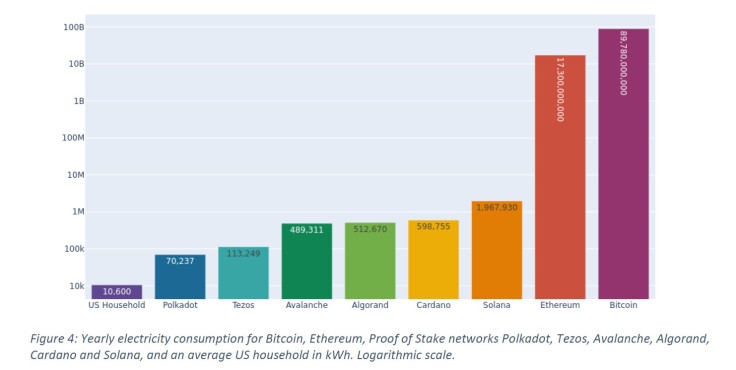US Pressures Crypto Miners To Report Carbon Emissions To Address Soaring Energy Use
KEY POINTS
- US lawmakers introduce a bill to combat heavy energy usage by crypto miners
- Crypto mining operations with over 5 megawatts must report emissions
- Lena Klaaßen says more transparency on the energy sources used for Bitcoin mining in the US is definitely welcomed
U.S. lawmakers have introduced a bill that requires more reporting and analysis of the climate and energy impacts of cryptocurrency mining.
Massachusetts Senator Edward J. Markey and California Representative Jared Huffman said in a statement Thursday that they have set forth the Crypto-Asset Environmental Transparency Act that pressurizes U.S. crypto miners, who use more than 5 megawatts of electricity, to disclose carbon emissions.
"Crypto-asset mining consumes massive amounts of electricity, most of which is generated by burning fossil fuels. This has an environmental impact on climate chaos equivalent to putting 30 million gas-burning cars on the road," Democratic Senator Markey noted. "This bill is an important step to understanding the full environmental impacts of these operations, as well as holding crypto mining operations accountable for the damage they cause," he further said.
It’s time we pull back the curtain on crypto’s harmful environmental impacts.
— Rep. Jared Huffman (@RepHuffman) December 8, 2022
Today, @SenMarkey and I introduced a bill to get the transparency we need for oversight and accountability in this industry.https://t.co/6jzDrRyIq1
In recent years, Bitcoin and other cryptos have faced harsh criticism for their electricity demand and carbon emissions. According to a fact sheet released by the White House in September, crypto-asset activity in the United States is estimated to result in approximately 25 to 50 metric tons of carbon dioxide per year (Mt CO2/y), which is 0.4% to 0.8% of total U.S. greenhouse gas emissions. This range of emissions is similar to emissions from diesel fuel used in railroads in the United States.
A separate report from the Crypto Carbon Ratings Institute (CCRI) in January noted that an average American household consumes about 10,600 kWh per year, while Bitcoin consumes 89.78 TWh (terawatt-hour).

Lena Klaaßen, the co-founder of CCRI, said that more transparency on the energy sources used for Bitcoin mining in the United States is definitely welcomed.
"The bill could also be an opportunity for the Bitcoin mining industry to substantiate their previous claims on a high share of green energy usage in the industry," she told International Business Times via mail. "We from CCRI welcome the plan to conduct a dedicated study on the matter to gain more transparency and are planning to contribute to it by proving comments," she added.
As per the bill, the United States Environmental Protection Agency would conduct a study on the environmental impacts of crypto mining, including analyzing the impact of energy demand on carbon dioxide emissions and examining local impacts on noise and water pollution of crypto mining facilities.
The U.S. state of Texas has been a center for crypto miners, given its business-friendly policies and cheap power. However, there are concerns about whether the grid could handle enormous computing power. The Texas Blockchain Council predicts that the state's crypto mining load would approximately double to 4,000 megawatts by the end of 2023.
"Ensuring crypto mining companies report their greenhouse gas emissions is a necessary step toward holding them accountable and protecting communities across the country that rely on the grid," Markey added.
New York recently became the first state to ban certain types of crypto mining in an effort to address pressing environmental issues over excessive energy usage.
Worldwide, 15 countries have restricted or banned crypto mining. China, which once hosted most of the crypto mining facilities in the world, announced a blanket ban on the use of cryptos in financial transactions in 2021. The ban, however, led to a crypto mining boom in other countries, particularly in the United States.
According to Klaaßen, in light of the imminent climate crisis, the priority should be on the decarbonization of the industry. "To do so, it may help to align the incentives of all stakeholders active in the crypto industry. Entities that hold Bitcoins or perform on-chain transactions are responsible for Bitcoin-related emissions as part of their scope 3 (value chain) emissions," she said.
She further told IBTimes, "If these entities were also subject to mandatory crypto-related scope 3 disclosures (for doing so, better transparency on mining-related emissions as demanded by the bill is a key enabler), there would be a common interest by the entire industry to drive down mining-related emissions."
[This article is amended with comments from Lena Klaaßen, co-founder of Crypto Carbon Ratings Institute]

© Copyright IBTimes 2024. All rights reserved.











